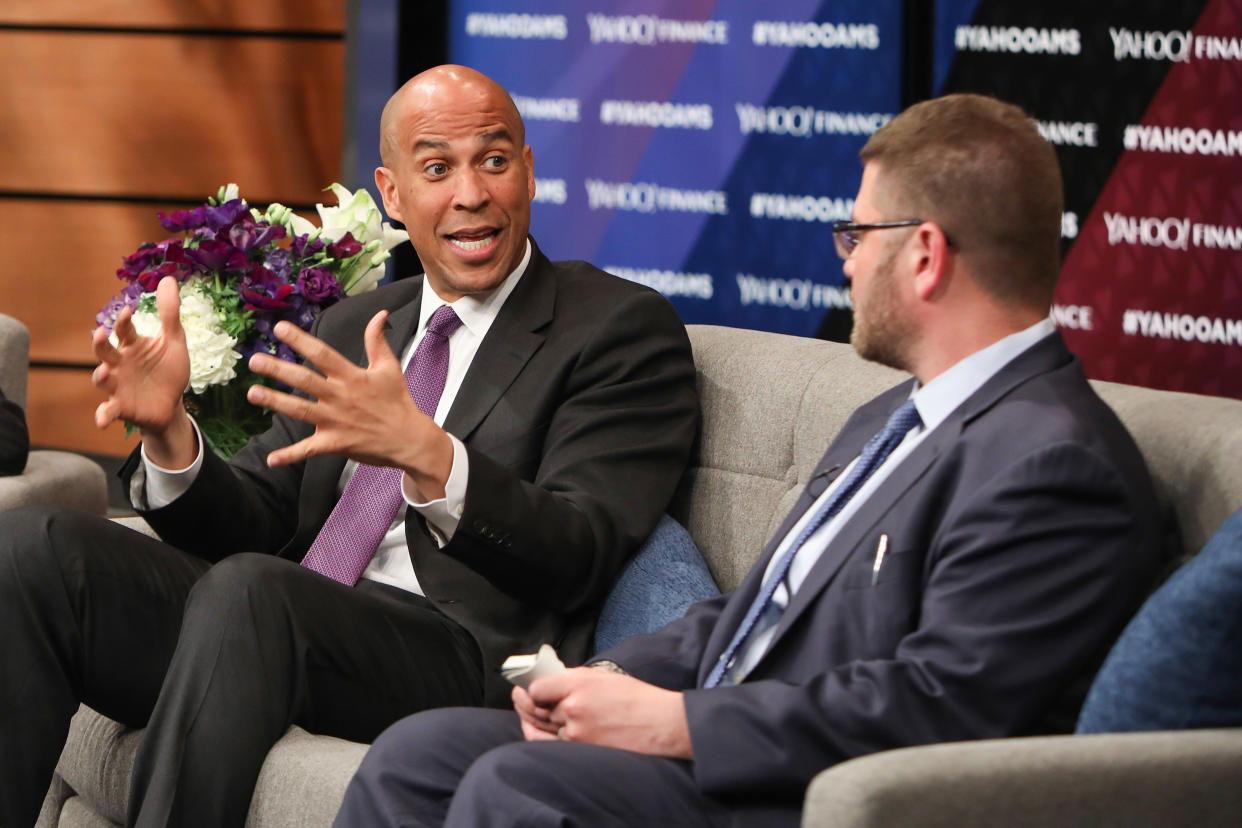Cory Booker gives details on 'baby bonds,' a 'new American birthright'

WASHINGTON — One of the most dramatic policy initiatives by Sen. Cory Booker, D-N.J., in his presidential campaign is a plan to provide $1,000 grants to every baby born in the U.S. The money would come in the form of a “baby bond” that would be added to during childhood, on a sliding scale depending on the family’s income. Booker and his campaign released a new analysis on Friday morning that provided further details about how his plan would address “the growing wealth gap.”
“So many Americans’ lives are dictated by how much money is in their parents’ bank accounts,” Booker said in a statement accompanying the report. “Their zip code, their job, and even how much student loan debt they have will impact the lives their children and their children’s children live. The failure to act against generations of discriminatory policies and an upside-down tax code has resulted in a racial wealth gap that is only growing. We have a responsibility to put an end to this injustice, and with Baby Bonds, we have an opportunity.”
Booker announced his baby bonds legislation, the American Opportunity Accounts Act, in the Senate late last year. Since launching his presidential campaign in February, it has become one of the core elements of his platform.
The Booker campaign’s analysis, which was crafted based on data from the University of Michigan’s Panel Study of Income Dynamics (PSID), provides details on how much Americans of different income levels would receive through the policy. Money from this policy could not be withdrawn before the account holder turns 18, and could be used only for specific purposes, including college expenses, home purchases, entrepreneurship and retirement. According to the analysis, “account size would range from just over $1,700 for individuals growing up in affluent households to nearly $50,000 for individuals raised in very low-income households.”
“At age 18, half of all accounts would contain more than $15,000, and one in 10 accounts would contain more than $44,000,” the report said. “Since accounts would continue to accrue interest after the account holder turns age 18, the median account would contain nearly $22,000 by age 30, assuming no prior withdrawals. Accounts for individuals growing up in the lowest-income households would contain more than $66,000 by age 30.”
The $1,000 baby bonds would be given only to people born after the policy was enacted. However, children who were born prior to the policy taking effect would still receive the annual supplemental payments based on their family’s income level.
Booker’s analysis said the policy would “flip the script” on the current dynamic where only children from wealthier households can afford college.
“More than 1 in 7 account holders — those growing up in the poorest households — would have sufficient funds to cover 4 years of tuition and fees at the average public university. Nearly 7 in 10 accounts could fully cover two years of community college,” the report said.
The analysis also described the “transformative” impact the policy could have on home ownership.
“Our analysis found that 62 percent of account holders — disproportionately people of color — at age 30 would have sufficient funds for a 10 percent down payment on a national median starter home, and 44 percent would have sufficient funds for a 20 percent down payment,” the report said.
Booker’s campaign also highlighted a Columbia University study from last year that found “an intervention similar to Baby Bonds would nearly close the racial wealth gap among young adults.” Because the proposal would disproportionately benefit people with lower incomes, it would also disproportionately benefit minorities due to ongoing racial wealth disparities.
Some observers have said the plan could be considered a form of slavery reparations. Booker has not shied away from that characterization. In an interview with Yahoo News last year, Booker said his policy would definitely have a “racial impact” because of the “stunning” wealth gaps between people of different races, but he said the policy “ultimately is about income.”
“Even though disproportionately it’s the African-Americans stuck, the reality is we have a country right now where … lowest income people are not finding ladders to success. They’re finding quicksand,” Booker said, adding, “There’s disproportionately minorities in that quicksand. But there’s white folks as well.”
Polls show Booker is currently behind the leaders of the crowded Democratic primary pack. Senior members of his campaign recently told Yahoo News they’re confident he is well-positioned to eventually gain ground. They have a two-pronged strategy focused on organizing in key early states and building out a detailed policy agenda.
Sen. Elizabeth Warren, D-Mass., has led the Democratic field by releasing over 20 detailed policy proposals. Booker hasn’t matched her, but he’s ahead of the rest of his rivals with a platform that is centered on the idea of “justice.” In addition to the “baby bonds” plan, Booker has proposed a dramatic expansion to the earned income tax credit, voting rights protections and an “environmental justice plan.” Earlier this month, he introduced a gun control plan that included mandating traceable microstamps on handgun shells.
_____
Read more from Yahoo News:
In quest for Gen Z votes, 2020 could be the year of the influencer
How Trump's embrace of a rogue Libyan warlord sparked a humanitarian catastrophe




